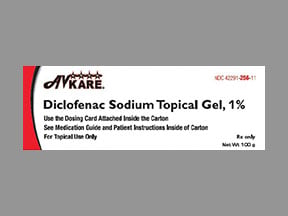
Voltaren Arthritis Pain Coupons & Savings Card – Discount Prices from $9.65
Brand for: Diclofenac sodium
My prescription
Edit
100GM of 1%, Diclofenac Sodium (1 Tube)
Select pharmacy

Albertsons
$9.65
COUPON PRICE
Walgreens
$10.99
COUPON PRICE
Walmart
$19.56
COUPON PRICEVoltaren Arthritis Pain savings card
Show this card to your pharmacist
Albertsons
$9.65
BIN
ID
PCN
GRP
019876
LHD7A884A5
CHIPPO
LHX
Powered by
More prescriptions for rheumatoid arthritis
More prescriptions for rheumatoid arthritis
Voltaren Arthritis Pain (Diclofenac Sodium) dosage forms
Dosage Quantity Price from Per unit 100GM 1 Tube $9.65 $9.65 100GM 2 Tubes $11.80 $5.90 100GM 3 Tubes $13.95 $4.65 100GM 4 Tubes $16.10 $4.03 100GM 5 Tubes $18.26 $3.65
| Dosage | Quantity | Price from | Per unit |
|---|---|---|---|
| 100GM | 1 Tube | $9.65 | $9.65 |
| 100GM | 2 Tubes | $11.80 | $5.90 |
| 100GM | 3 Tubes | $13.95 | $4.65 |
| 100GM | 4 Tubes | $16.10 | $4.03 |
| 100GM | 5 Tubes | $18.26 | $3.65 |
Does Voltaren really work for arthritis pain?
Voltaren, which contains the active ingredient diclofenac, is a nonsteroidal anti-inflammatory drug (NSAID) that is commonly used to relieve pain and reduce inflammation associated with arthritis. Many patients find it effective for managing arthritis pain, particularly in conditions like osteoarthritis. However, individual responses can vary, and it is important for patients to consult with their healthcare provider to determine if Voltaren is appropriate for their specific condition and to discuss any potential side effects.
Who should not use Voltaren arthritis cream?
Voltaren arthritis cream should not be used by individuals who are allergic to diclofenac or any other ingredients in the product. It is also not recommended for those who have had allergic reactions to other nonsteroidal anti-inflammatory drugs (NSAIDs) such as aspirin or ibuprofen. Additionally, it should not be used on open wounds, infections, or irritated skin. Pregnant women, especially in the third trimester, should avoid using it unless directed by a healthcare provider. It is important for individuals to consult with a healthcare professional before using Voltaren if they have any underlying health conditions or are taking other medications.
What medications cannot be taken with Voltaren?
Voltaren (diclofenac) should be used cautiously with certain medications due to potential interactions. These include:1. Anticoagulants (e.g., warfarin) - May increase the risk of bleeding.2. Other NSAIDs (e.g., ibuprofen, aspirin) - Can increase the risk of gastrointestinal bleeding and ulcers.3. Corticosteroids (e.g., prednisone) - May also increase the risk of gastrointestinal issues.4. ACE inhibitors and ARBs (e.g., lisinopril, losartan) - Can reduce the effectiveness of these blood pressure medications and may affect kidney function.5. Diuretics (e.g., furosemide) - May reduce the effectiveness of diuretics and affect kidney function.6. Lithium - Can increase lithium levels, leading to toxicity.7. Methotrexate - May increase the risk of methotrexate toxicity.8. Selective serotonin reuptake inhibitors (SSRIs) - May increase the risk of bleeding.It is important to consult a healthcare provider before combining Voltaren with any other medications.
Does Voltaren cream get into your bloodstream?
Voltaren cream, which contains the active ingredient diclofenac, is a topical medication. When applied to the skin, only a small amount of the drug is absorbed into the bloodstream. The primary action of Voltaren cream is localized to the area where it is applied, providing relief from pain and inflammation. However, systemic absorption is minimal compared to oral forms of the medication.
Can you use Voltaren gel if you have high blood pressure?
Voltaren gel, which contains diclofenac, is a topical nonsteroidal anti-inflammatory drug (NSAID). While it is generally considered safer than oral NSAIDs for individuals with high blood pressure, it is still important to use it with caution. Topical NSAIDs have less systemic absorption, but there is still a potential for some absorption that could affect blood pressure. It is advisable for individuals with high blood pressure to consult with their healthcare provider before using Voltaren gel to ensure it is safe for their specific condition.
